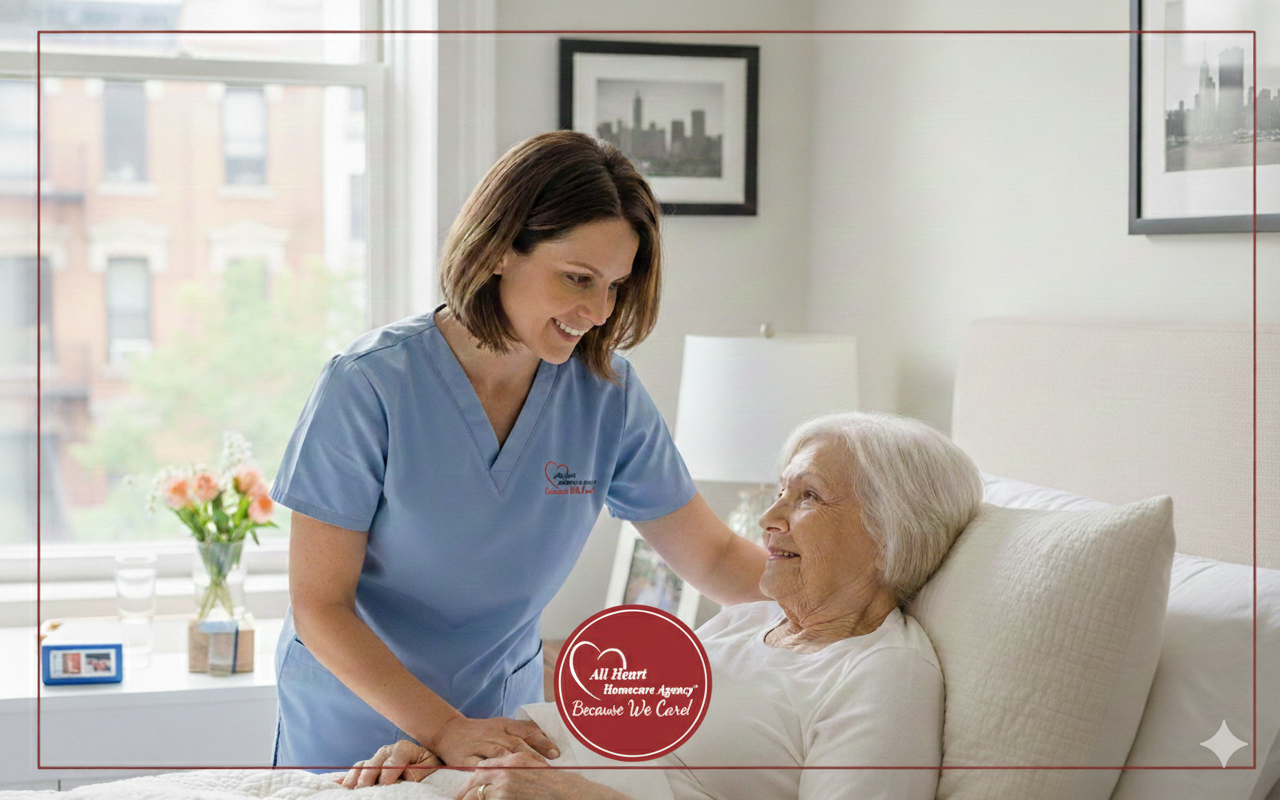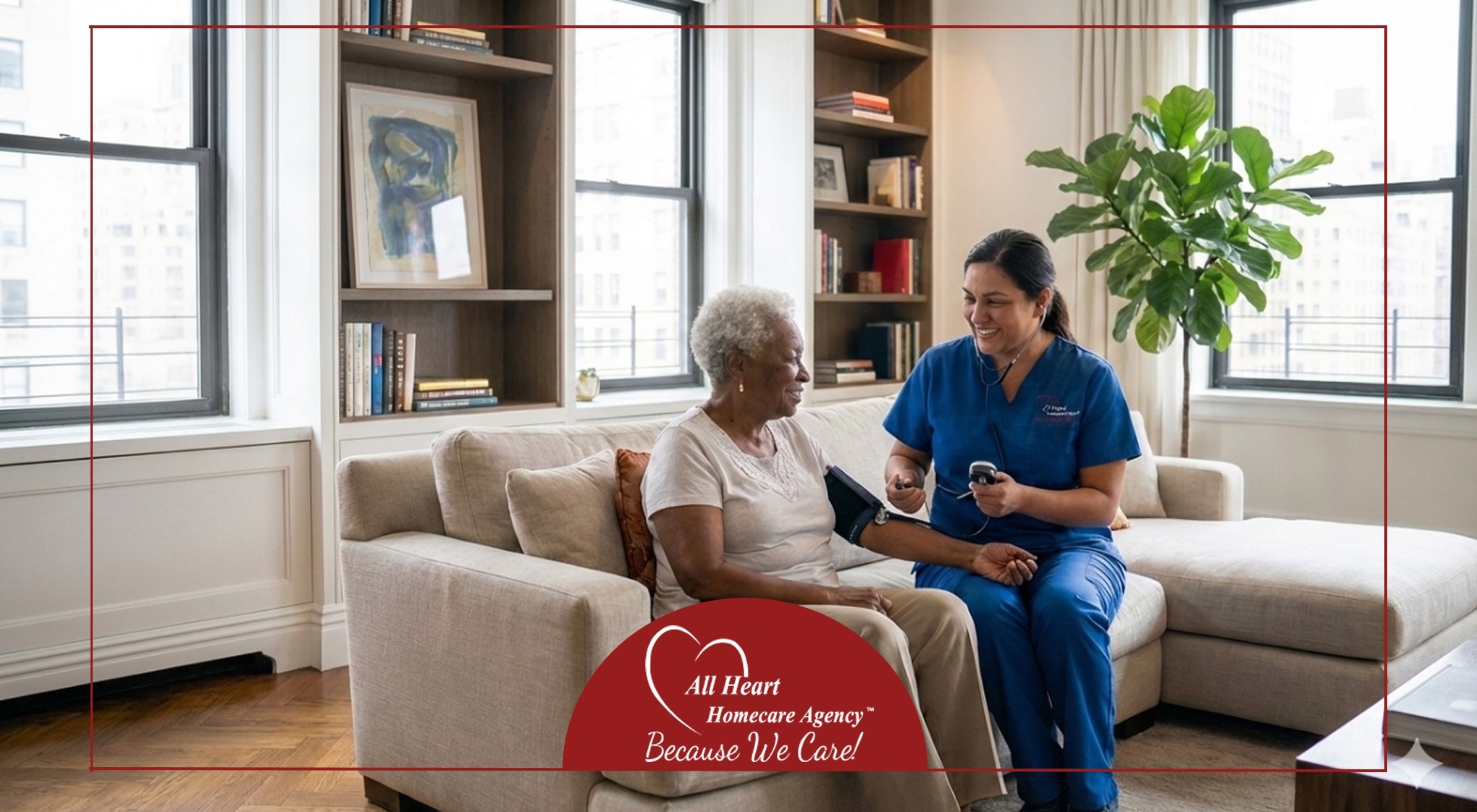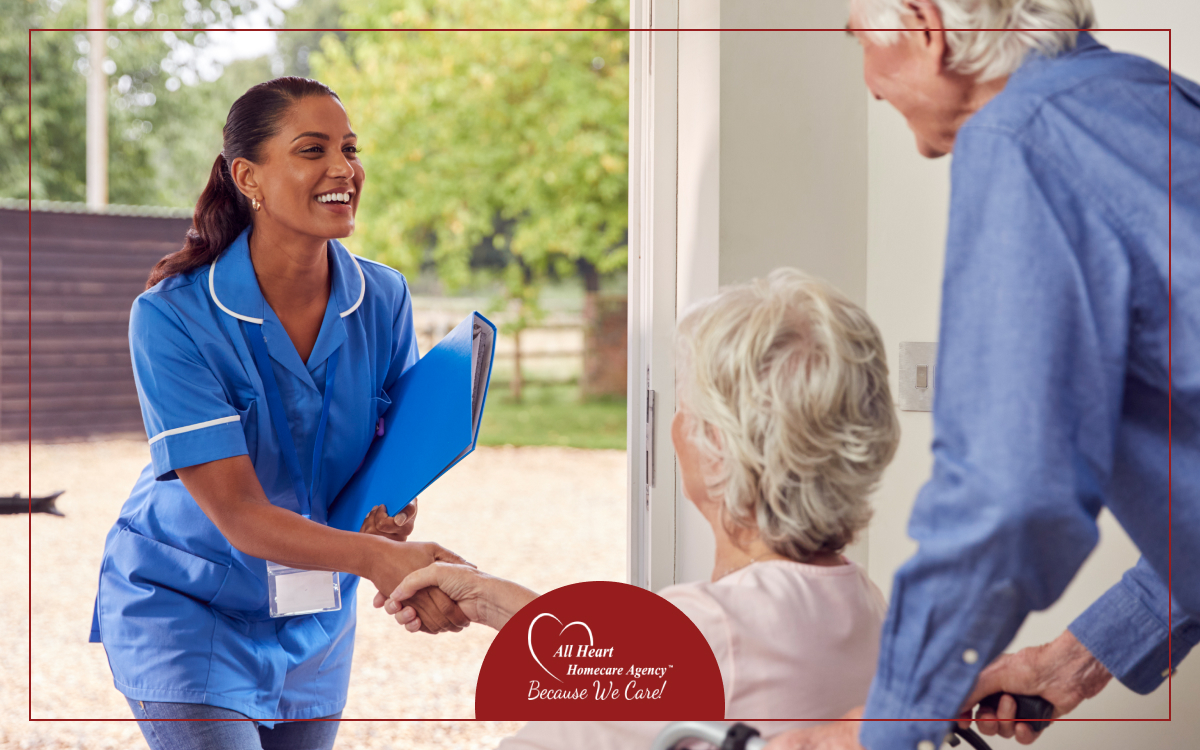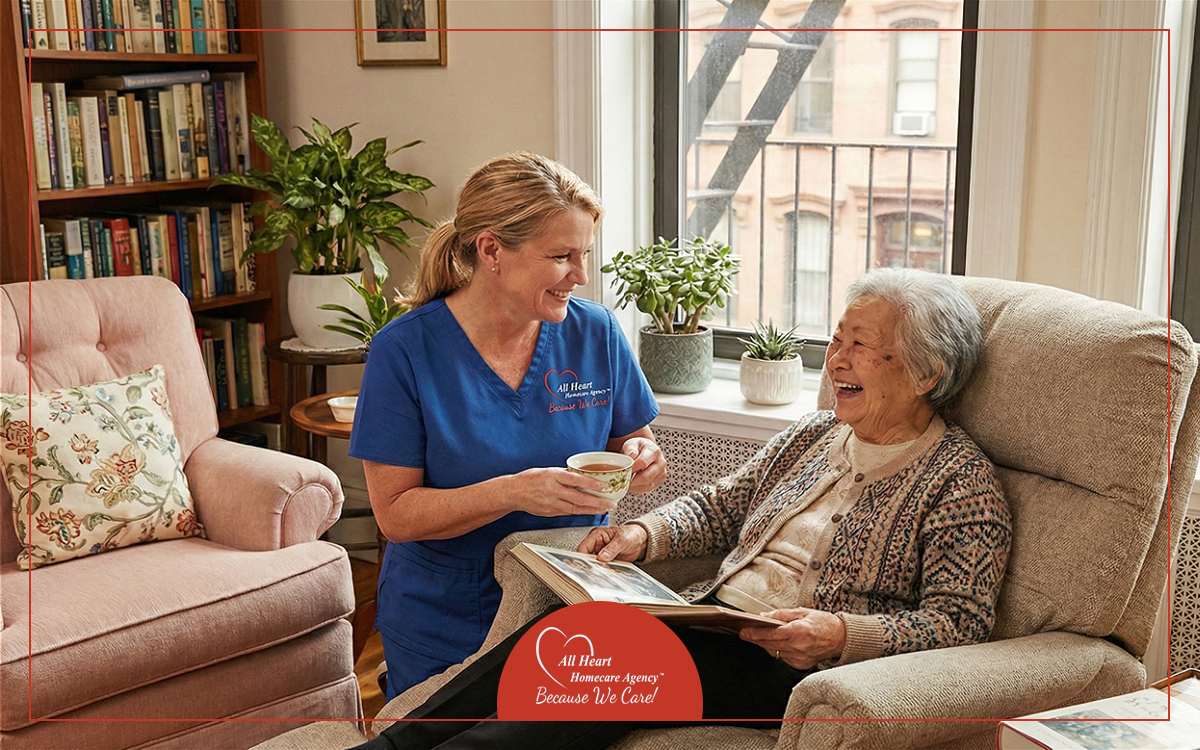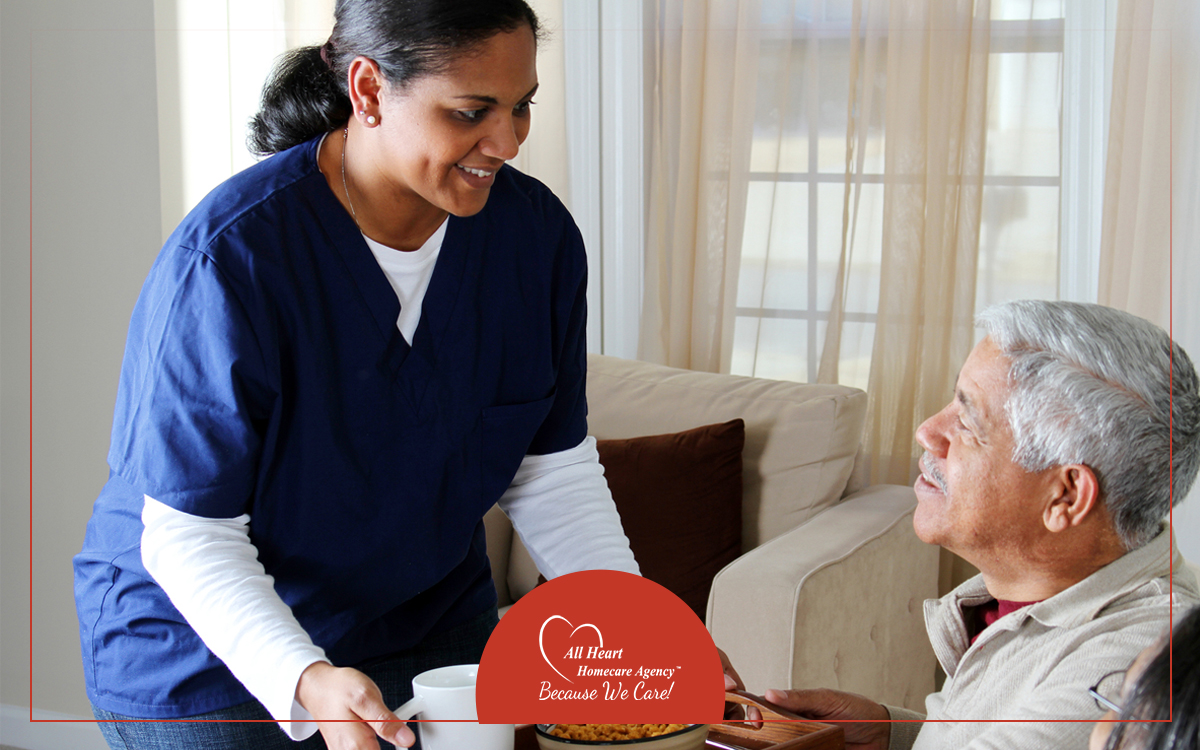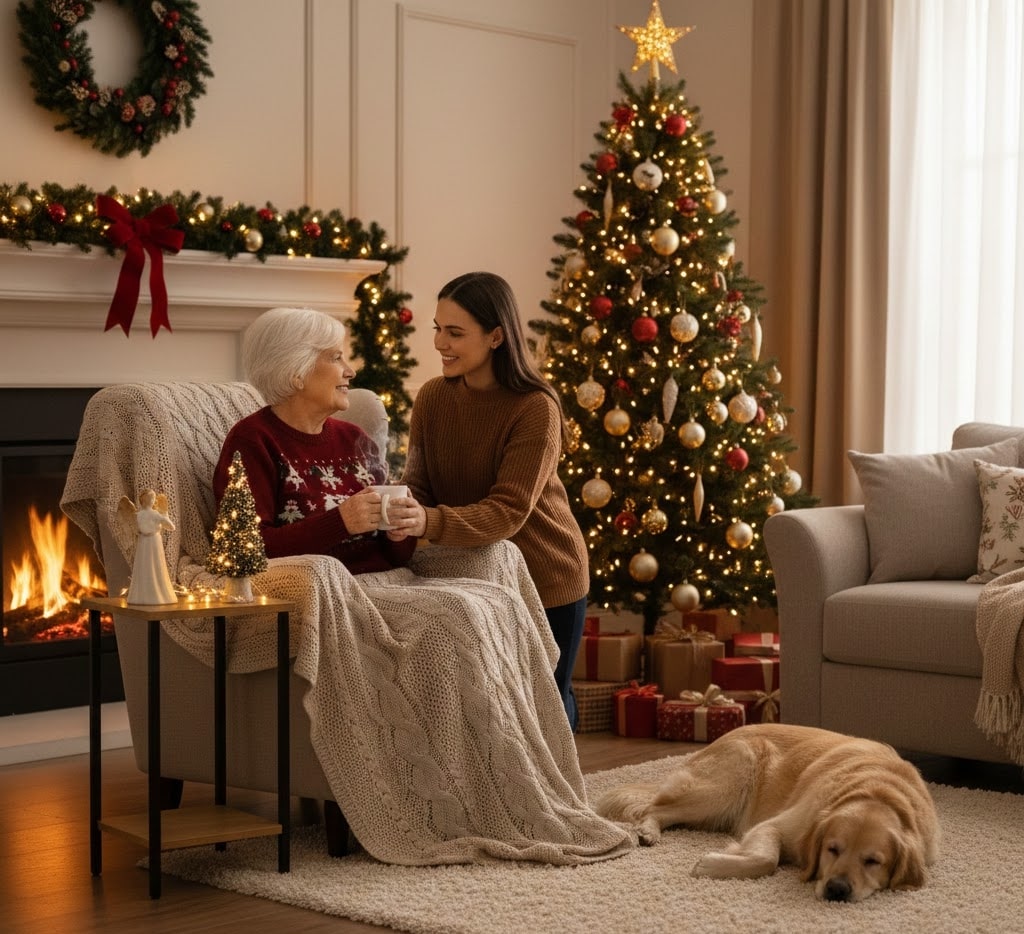How Can Alzheimer’s Patients Be Cared for at Home?
Caring for someone with Alzheimer’s at home requires structure, consistency, and personalized support. Daily routines, a familiar environment, clear communication, and supervision tailored to the person’s stage of the disease all play a critical role. Many families combine hands-on caregiving with professional in-home support to maintain safety, reduce confusion, and protect both the patient’s well-being and the caregiver’s health.
Receiving an Alzheimer’s diagnosis for a loved one brings a wave of emotions—love, concern, and often, a deep sense of uncertainty. The path forward can feel unclear, and the desire to provide the best possible care is overwhelming. If you’re navigating this journey, please know you are not alone. Many families find themselves asking, “What comes next?” and “How can we continue to provide a life filled with love and dignity at home?”
This guide is here to offer comfort and clarity. As a Brooklyn-based agency certified in Alzheimer’s care and a proud member of the Alzheimer’s Association, we’ve created this comprehensive guide for 2025 to walk you through new strategies, technologies, and the essential support systems available. We want to empower you with practical, heartfelt advice on creating a safe environment, managing daily life, and finding strength in community. By the end, you’ll have actionable knowledge to help you provide the compassionate care your loved one deserves.
Understanding the Journey: Can I Care for an Alzheimer’s Patient at Home?
This is one of the first and most emotional questions families face. The answer for many is a hopeful yes. Providing Alzheimer’s at-home care is a loving and viable option, but it requires preparation, patience, and a strong support network.
Alzheimer’s disease progresses through stages, and care needs will evolve over time. In the early stages, your loved one may only need gentle reminders and companionship. As the disease advances, their need for hands-on assistance with daily tasks will increase. The decision to provide care at home depends on your loved one’s stage of the illness, the safety of the home environment, and the support available to you as a caregiver. It’s a journey of adaptation, and with the right resources, it can be a path filled with moments of connection and grace.
Part 1: Creating a Safe and Supportive Home Environment

A safe and calm home is the foundation of effective dementia home care. It reduces anxiety for your loved one and provides peace of mind for you.
Safety First: Simple modifications can prevent accidents and make the home more navigable.
- Secure all rugs to the floor or remove them to prevent trips.
- Install grab bars in bathrooms and hallways for added stability.
- Use locks on cabinets containing medications, cleaning supplies, or sharp objects.
Creating a Calm Atmosphere: A peaceful environment can significantly decrease agitation and confusion. Reduce loud noises from the TV or radio, and keep living spaces free of clutter. Surround your loved one with familiar objects, such as cherished photographs or favorite blankets, to create a sense of comfort and belonging.
Design for Dementia: New concepts in home design can aid recognition and independence. Consider using color-coding to help your loved one distinguish between different rooms or find important items. For example, a brightly colored toilet seat can make the bathroom easier to locate.
Part 2: New Strategies for Daily Routines and Engagement
Consistency is a source of comfort for individuals with Alzheimer’s. A predictable daily routine can reduce stress and anxiety by creating a familiar rhythm to the day.
The Power of Routine: A structured schedule helps anchor your loved one’s day.
| Time | Activity | Notes |
| Morning | Breakfast, personal care, gentle stretching | Start the day calmly and consistently. |
| Mid-Day | Light activity (e.g., gardening, listening to music) | Engage the mind and body without overstimulation. |
| Afternoon | Lunch followed by a quiet rest period | Balance activity with downtime to prevent fatigue. |
| Evening | Dinner, relaxing activity (e.g., looking at photos), prepare for bed | Wind down peacefully to encourage a restful night. |
Engaging Activities: Meaningful engagement is vital for emotional well-being. The goal isn’t to be busy but to find joy in simple, shared moments. This is where memory care support at home can be incredibly valuable, offering activities tailored to your loved one’s abilities.
- Listen to music from their youth.
- Look through old photo albums together.
- Work on a simple puzzle or fold laundry side-by-side.
Communication Techniques: As the disease progresses, communication will change. Focus on connection over correction. Use short, simple sentences and speak in a gentle, reassuring tone. Non-verbal cues, like a warm smile or a gentle touch on the arm, can convey love and support when words fail. Above all, listen with your heart.
Part 3: Leveraging Technology in Alzheimer’s Home Care for 2025
Technology is offering new ways to enhance safety and quality of life. For 2025, several innovations can provide an extra layer of support.
Smart Home Devices: Voice assistants like Alexa or Google Home can be programmed to provide medication reminders, play favorite songs, or answer simple questions, fostering a sense of independence.
Monitoring and Safety Tech: Modern tools offer peace of mind. GPS tracking pendants can help locate a loved one who wanders, while automatic fall detectors can alert you or emergency services if a fall occurs. Simple video monitors can allow you to check in without being intrusive.
Digital Therapeutics and Apps: Emerging apps are designed to provide cognitive stimulation through games and puzzles. Other apps help caregivers track symptoms, manage medications, and coordinate care schedules with other family members or professional caregivers.
Part 4: The Heart of Care: Finding Support for You and Your Loved One

Remember, you are not meant to do this alone. Building a support team is one of the most important steps you can take.
Building Your Support Team
In-home support is a cornerstone of effective Alzheimer’s and dementia care, benefiting both you and your loved one. Professional caregivers who specialize in home health care for Alzheimer’s patients can provide invaluable assistance with medical needs, personal care, and daily tasks. This dedicated in-home support for dementia patients offers you essential time to rest and recharge, helping to prevent caregiver burnout. If you are seeking Alzheimer’s care at home, a trusted local agency can make all the difference.
At All Heart Homecare, we have over 13 years of heartfelt experience caring for individuals with Alzheimer’s and dementia, as well as supporting their families. We are deeply proud to have been recognized as one of the best agencies in Brooklyn for the last three years, a testament to our commitment to providing compassionate, professional, and reliable care.
Connecting with Local Resources and Community
You don’t have to navigate this journey by yourself. We encourage you to connect with your local Alzheimer’s Association chapter, which offers a wealth of information and supportive communities. Adult day centers can also be a wonderful resource, providing a safe and engaging environment for your loved one while giving you a much-needed and well-deserved break.
Prioritizing Your Well-being as a Caregiver
Your health and well-being are just as important as your loved one’s. It is not selfish to prioritize your own needs; it is a necessity for providing sustained, loving care. Remember to take short breaks throughout the day, maintain connections with friends, and never hesitate to ask for help when you need it. Respite care—whether from family, friends, or a professional caregiver—is vital for your long-term physical and emotional well-being.
You Are Not Alone on This Journey
Providing Alzheimer’s care at home is a testament to love and dedication. By creating a safe environment, establishing comforting routines, embracing helpful technology, and building a strong support system, you can navigate this path with grace and confidence. Every act of kindness, every patient moment, and every gentle touch makes a world of difference.
Your love is the most powerful tool you have. If you feel overwhelmed or are ready to explore personalized in-home support for dementia patients, our compassionate team at All Heart Homecare is here to help. We have over 13 years of experience and a team that genuinely loves what they do. Let’s create a care plan together that honors your loved one and supports your entire family.



